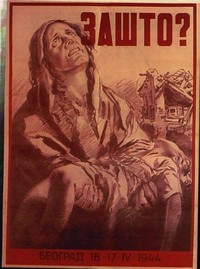Appeals to Historical Authority Justifying Mass Violence in Pamphlets
joint talk by Juliane Prade-Weiss, Vladimir Petrovic & Dominik Markl
25 February 2022, 11:45am - 1:00pm
at the online-conference
Activist Writing: The Pamphlet in Practice, History, Media and the Popular Sphere
Serbian propaganda poster denouncing the bombing of Belgrade
by the Allies on 16-17 April 1944 (caption: "Why?")
abstract
In 1931, Walter Benjamin wonders, “Won’t inscription become the most important part of the photograph?” (SW2.2:527) It certainly is essential to photographs and other images on propaganda pamphlets that justify mass violence as they rely on presenting a clear-cut image of a demonized enemy and impending victimization. In inscriptions, such pamphlets often frame their discourse as legitimate by appealing to the authority of seminal texts or narratives of the cultural canon. Appeals to serves to call to violent action by carving out a prospect of the desolate consequences of inaction based on identificatory historical narratives. The contribution combines literary and cultural studies with history to analyze different layers of justificatory discourses: invoked historical references, rhetoric, textual pragmatics, as well as reception histories. Instances to be discussed are:
- anti-NATO pamphlets in the Yugoslav war that refer to pamphlets circulated in earlier conflicts: from the 19th century condemnations of mass warfare in the Crimean war to the Second World War bombings of Belgrade and Nazi atrocities,
- ISIS pamphlets referencing the crusades to mock the Western “war on terror” in Iraq,
- extremist Zionist pamphlets invoking historical models for the justification of violence from the Bible such as Psalm 137,
- self-victimizing appeals of the German Querdenker movement to Sophie Scholl, one of the authors of the White Rose pamphlets calling for non-violent resistance against the Nazi regime (which relied heavily on appeals to cultural and religious authorities).
Appeals to authority in calls for mass violence rely on appropriations of the position of the victim in re-interpretations of historical narratives that claim moral esteem. The historical narratives evoked are forms of “premediation” in Astrid Erll’s sense that “existent media which circulate in a given society provide schemata for new experience and its representation” (2008:111) in different cultural spheres and for the sake of divergent interests.
Analyzing the premediation of experience granted by texts and other media of the cultural canon assumes that while authors refer to them with a particular (conscious) intent, they convey a plurality of implications ‒ such as narrative matters, performance structures, and moral validations ‒ that remain implicit, and yet active. These (non-conscious) implications are particularly relevant to discourses justifying mass violence as they are marked by trauma and sequelae of perpetration such as deferral and denial which become apparent in lacuna in speech and narrative incoherence.
Rather than outright ideological conviction, references to authority might well be a mere pretext to manifest material or strategic interests. Nevertheless, even a pretext is a text that carries implications which shape its reception. Appeals to historical authority in pamphlets which justify mass violence may thus appear as transparent rhetorical devices in a claim of power and righteousness. It is, still, too easy to dismiss them as irrelevant because they are part of an ongoing transmission of justificatory narratives which often establish the terminology, narratives, and heuristics in which acts of mass violence are subsequently discussed even by critical voices.


